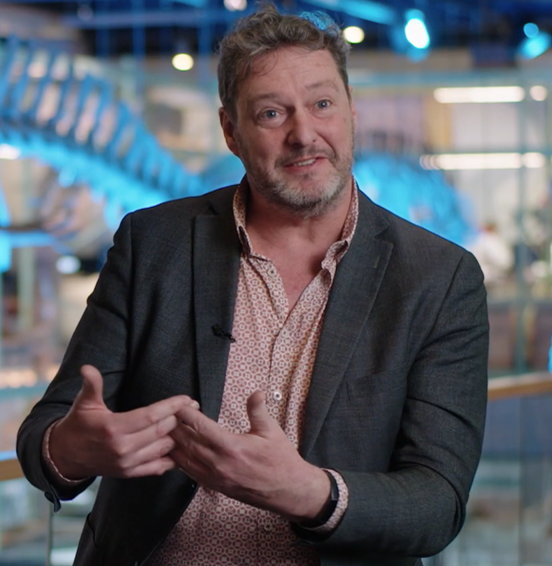‘Tackling the loss of nature with a KPI’
A conversation with Koos Biesmeijer, Naturalis Biodiversity Center.
On behalf of Naturalis Biodiversity Center, Koos Biesmeijer is leading the way in the battle against the loss of biodiversity, where the Netherlands still holds the dubious title of ‘world champion’. He’s been working with BNP Paribas to achieve that goal. Together, they’re developing biodiversity instruments and indicators to spur companies to make a positive impact.
The crew in the LiveScience room at Naturalis are hard at work on five skeletons of the Triceratops, a big rhino-like dinosaur. Scientific director Koos Biesmeijer has little difficulty making himself heard above the piercing noise of the polishing machines. He’s all fired up about his mission: to reduce the loss of biodiversity. It actually started when he, as a small boy, would wander about in the Veluwe, a forest-rich ridge of hills in the Netherlands. He went on to study bees and pollination. And while he enjoyed that detective work, he knew he wanted to do more than just publish. ‘When in 2006 I discovered that the bee population in the Netherlands and in the UK was rapidly going downhill, it turned out that the world wanted to know more.’ He found out that people were really struck by the idea of losing our biodiversity and that he himself might be able to bring about some sort of change.
Insidious process
Naturalis Biodiversity Center gives him the opportunity to do exactly that. He started there as a researcher – today he’s Professor of Natural Capital at Leiden University. But now as Naturalis’s scientific director, he’s mainly occupied with their social mission. It’s certainly urgent enough. Biodiversity, which humans need to survive, is going downhill, Biesmeijer explains. ‘The butterflies in the Netherlands provide a good illustration. If you out go for a walk, you’ll see far fewer of them than before.’ According to recent figures from Statistics Netherlands and Dutch Butterfly Conservation, the populations of daytime butterflies decreased by an average of 53% between 1992 and 2023. Biodiversity loss is an insidious process where you don’t notice anything at first, Biesmeijer explains. ‘However, it poses a huge threat to society and companies. Without bees, we’d have no apples, pears or coffee. It would also cost a lot more money to produce your food.’ In the Netherlands, you can see nature disappearing right in front of your eyes, says Biesmeijer: ‘We’re the world champion in the loss of biodiversity.’ We have less nature per surface area than most other countries. Practically all of it is of poor quality, no matter how hard we try.’
The loss of biodiversity means that company risks are harder to assess. This means that banks need to become more critical. They can use their financing to encourage companies to make the transition to activities that don’t harm biodiversity.
Koos Biesmeijer, scientific director Naturalis Biodiversity CentER

Good news
When it comes to biodiversity, you can’t avoid some alarming facts – but luckily there’s some good news too. ‘We know what we need to do about it, says Biesmeijer. ‘The only problem is that we still tend towards small steps, like a nice shoreline or a hedge. Unfortunately that doesn’t really help if we keep emitting too much nitrogen and using dangerous pesticides. The system really needs to change. And that’s not easy. The long-term interest of nature often loses out to short-term policymaking.’
He believes the real way to do something about that is to join forces. ‘If you want to change the system, you need to work together. That’s why we work with governments, companies and banks who share our dream of a biodiverse future.’ Naturalis can serve as an independent knowledge partner to others. ‘We map biodiversity and keep an eye on the latest developments. Our approach is quite innovative. Like with ARISE, with which we’ll soon identify and map all 35,000 species of plant, animal and fungal life, and more, in the Netherlands through DNA analysis, imaging and artificial intelligence.’ By his own account, Biesmeijer is a ‘huge fan of working with the financial sector’. That’s because it focuses on the long term. ‘The loss of biodiversity means that company risks are harder to assess. This means that banks need to become more critical. They can use their financing to encourage companies to make the transition to activities that don’t harm biodiversity.’
Urgent action needed
Naturalis and BNP Paribas entered into a multi-year partnership at the end of 2023. The aim is to speed up the preservation and restoration of biodiversity. BNP Paribas seeks to lead the way in this area in the financial world, says Guido van den Brande (Co-Head of Corporate Coverage for BNP Paribas Netherlands) in the LiveScience room at Naturalis. He believes that’s even more important than cutting CO2. ‘It’s about the world where we all have to live, now and in the future.’ Van den Brande explains that BNP Paribas already takes biodiversity into account in its investment decisions. ‘We want to prevent deforestation and business activities that are located too close to fragile natural habitats. That means sometimes saying no to a loan application or laying down conditions to prevent the loss of biodiversity. We also actively invest in projects to improve biodiversity. We have three billion euros at our disposal for that purpose from BNP Paribas Group.’ Since the past two years, Van den Brande has noticed that biodiversity has been a rising topic for clients. ‘The loss of biodiversity now threatens all their future business. If not enough bees pollinate the flowers, that could jeopardise beer, cacao or coffee production, for instance.’ That’s why BNP Paribas supports large companies in making resources traceable. Do they come from areas that are vulnerable: yes or no? That enables those companies to make better decisions.
Incentive for financial innovations
Advising clients about biodiversity is something BNP Paribas can’t do alone. That makes an independent scientific institute like Naturalis indispensable. In that sense, the partnership is only logical. The two of them have agreed to work together on research, monitoring and data, and education and awareness. They’re going to create an impetus for financial innovations that reorient capital flows towards the preservation and restoration of biodiversity. They are also developing financial instruments and measurement indicators that make is easier to incorporate biodiversity into decision-making, risk management and investment decisions. Large companies are increasingly interested in the last one. Because of European regulations (CSRD), they have to report on sustainability objectives. Impact on biodiversity could be one of those. Unfortunately, that’s still difficult to measure. Which is why Naturalis and KPMG are developing a measuring instrument for that purpose. That will identify the effects of economic activities, such as the sourcing of palm oil or lithium, on biodiversity. And that, in turn, will make it easier to take account of the impact on biodiversity when making business decisions.
Key performance indicator
BNP Paribas wants to encourage clients to see biodiversity more often as an impact factor. One way is for the bank to offer discounts on loans, says Van den Brande. ‘Biodiversity can be one of the sustainability objectives on which we base our discounts for banking services, but we do not yet have a key performance indicator for biodiversity impact. We’re going to develop that together with Naturalis.’ Van den Brande explains that the partnership with Naturalis goes much further than a traditional donation relationship. ‘This requires much more action by both sides. We need to enthuse our clients and put people together, but this topic is more than worth it.’ What does Biesmeijer think it will take to make the marriage a success? ‘The trick is for us to focus on where we can really make the difference. Impact is our ultimate goal.’”
Click here to read more about our partnership with Naturalis

Read the other stories of frontrunners in the Netherlands.
Check out how we collaborate with partners and clients in our international network.